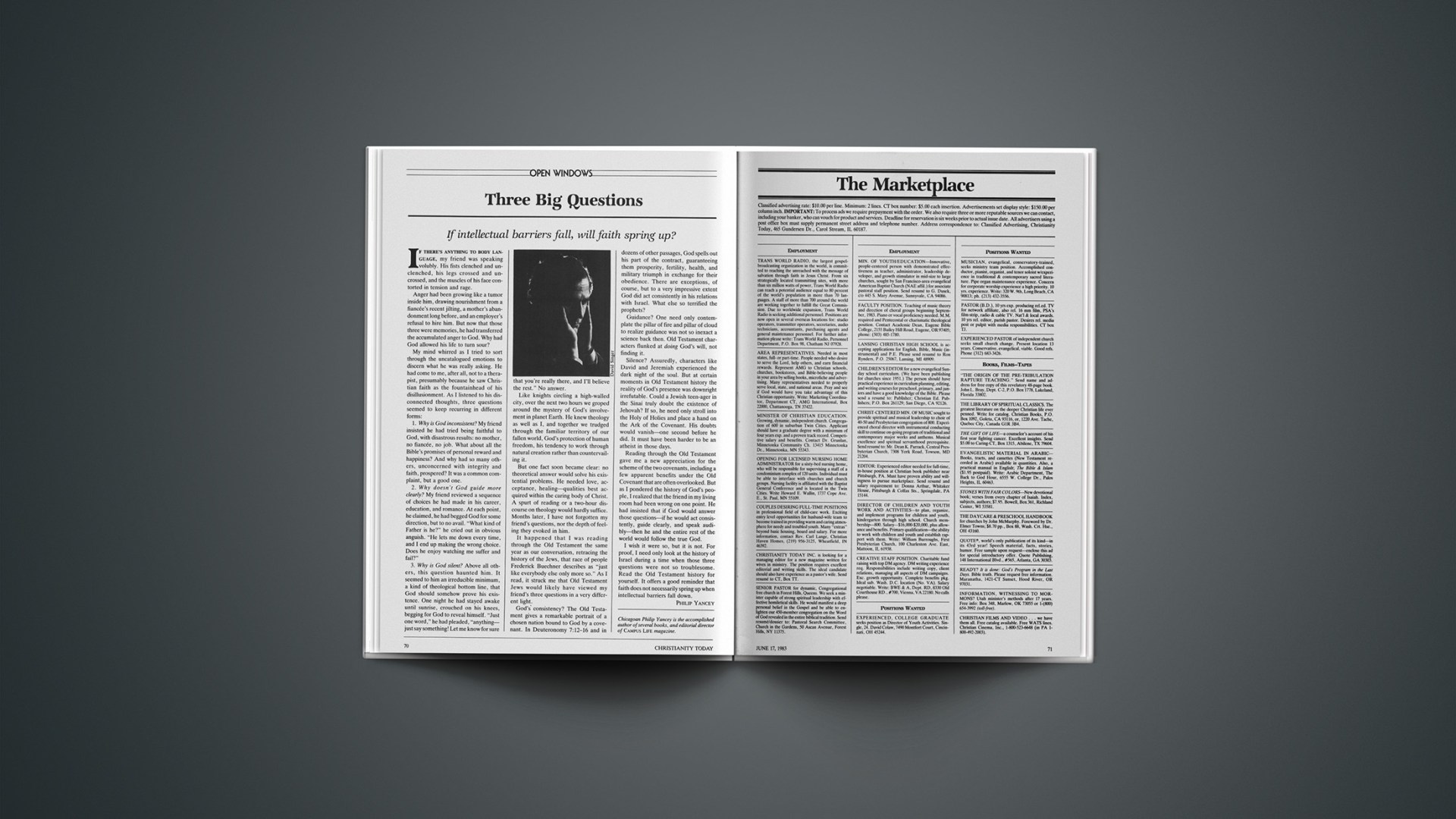If intellectual barriers fall, will faith spring up?
If there’s anything to body language, my friend was speaking volubly. His fists clenched and unclenched, his legs crossed and uncrossed, and the muscles of his face contorted in tension and rage.
Anger had been growing like a tumor inside him, drawing nourishment from a fiancée’s recent jilting, a mother’s abandonment long before, and an employer’s refusal to hire him. But now that those three were memories, he had transferred the accumulated anger to God. Why had God allowed his life to turn sour?
My mind whirred as I tried to sort through the uncatalogued emotions to discern what he was really asking. He had come to me, after all, not to a therapist, presumably because he saw Christian faith as the fountainhead of his disillusionment. As I listened to his disconnected thoughts, three questions seemed to keep recurring in different forms:
1. Why is God inconsistent? My friend insisted he had tried being faithful to God, with disastrous results: no mother, no fiancée, no job. What about all the Bible’s promises of personal reward and happiness? And why had so many others, unconcerned with integrity and faith, prospered? It was a common complaint, but a good one.
2. Why doesn’t God guide more clearly? My friend reviewed a sequence of choices he had made in his career, education, and romance. At each point, he claimed, he had begged God for some direction, but to no avail. “What kind of Father is he?” he cried out in obvious anguish. “He lets me down every time, and I end up making the wrong choice. Does he enjoy watching me suffer and fail?”
3. Why is God silent? Above all others, this question haunted him. It seemed to him an irreducible minimum, a kind of theological bottom line, that God should somehow prove his existence. One night he had stayed awake until sunrise, crouched on his knees, begging for God to reveal himself. “Just one word,” he had pleaded, “anything—just say something! Let me know for sure that you’re really there, and I’ll believe the rest.” No answer.
Like knights circling a high-walled city, over the next two hours we groped around the mystery of God’s involvement in planet Earth. He knew theology as well as I, and together we trudged through the familiar territory of our fallen world, God’s protection of human freedom, his tendency to work through natural creation rather than countervailing it.
But one fact soon became clear: no theoretical answer would solve his existential problems. He needed love, acceptance, healing—qualities best acquired within the caring body of Christ. A spurt of reading or a two-hour discourse on theology would hardly suffice. Months later, I have not forgotten my friend’s questions, nor the depth of feeling they evoked in him.
It happened that I was reading through the Old Testament the same year as our conversation, retracing the history of the Jews, that race of people Frederick Buechner describes as “just like everybody else only more so.” As I read, it struck me that Old Testament Jews would likely have viewed my friend’s three questions in a very different light.
God’s consistency? The Old Testament gives a remarkable portrait of a chosen nation bound to God by a covenant. In Deuteronomy 7:12–16 and in dozens of other passages, God spells out his part of the contract, guaranteeing them prosperity, fertility, health, and military triumph in exchange for their obedience. There are exceptions, of course, but to a very impressive extent God did act consistently in his relations with Israel. What else so terrified the prophets?
Guidance? One need only contemplate the pillar of fire and pillar of cloud to realize guidance was not so inexact a science back then. Old Testament characters flunked at doing God’s will, not finding it.
Silence? Assuredly, characters like David and Jeremiah experienced the dark night of the soul. But at certain moments in Old Testament history the reality of God’s presence was downright irrefutable. Could a Jewish teen-ager in the Sinai truly doubt the existence of Jehovah? If so, he need only stroll into the Holy of Holies and place a hand on the Ark of the Covenant. His doubts would vanish—one second before he did. It must have been harder to be an atheist in those days.
Reading through the Old Testament gave me a new appreciation for the scheme of the two covenants, including a few apparent benefits under the Old Covenant that are often overlooked. But as I pondered the history of God’s people, I realized that the friend in my living room had been wrong on one point. He had insisted that if God would answer those questions—if he would act consistently, guide clearly, and speak audibly—then he and the entire rest of the world would follow the true God.
I wish it were so, but it is not. For proof, I need only look at the history of Israel during a time when those three questions were not so troublesome. Read the Old Testament history for yourself. It offers a good reminder that faith does not necessarily spring up when intellectual barriers fall down.
PHILIP YANCEY1Chicagoan Philip Yancey is the accomplished author of several books, and editorial director ofCampus Lifemagazine.









